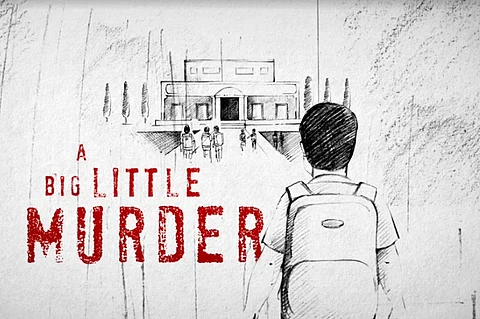

In September 2017, a gruesome crime in Gurugram shocked India. At a prominent international school, in what would have been an ordinary school morning, a seven-year-old boy was found bleeding profusely in the school toilet. The boy did not survive his injuries, and the subsequent investigation by the CBI led to another shocking revelation – a class 11 boy was accused of murdering the little one with a knife.
Now, a two-part documentary series A Big Little Murder revisits this chilling crime and asks some important questions – about the investigation by the Haryana police and the CBI, the role of the school’s administration and, most significantly, what we know about young people and the issues that they face.
Airing on Singaporean channel News Asia, the documentary has Mayurica Biswas and Pracheta Sharma as creative directors. The former is also the executive producer of the film, which took nearly a year to make.
With interviews with the parents of the deceased seven-year-old, the accused 16-year-old, nicknamed ‘Bholu’ by the Supreme Court to conceal his identity in accordance with the Juvenile Justice (Care and Protection of Children) Act and his friends, A Big Little Murder gives viewers insight into what happens in the aftermath of such a crime. The documentary successfully humanises both the children, even though it appears to pit both sets of parents against each other in the second episode – while Bholu’s parents are convinced that he is innocent, the parents of his alleged victim are convinced otherwise. Both pairs are determined to get justice for their children till the very end.
Presented in a relay format, the film introduces each character by how they came to know of the murder. In that process, however, the film does focus on the gruesome crime scene, which makes several appearances. And while the narrative of the film is such that it brings the characters to the crime scene, one cannot help but feel voyeuristic seeing the blood splatter, leading right up to the toilet which is covered in the child’s blood; the murder weapon, a knife, lying in the water of the Indian style lavatory.
The documentary reveals the problematic investigation by the Haryana police, who initially arrested a bus conductor, Ashok. This man was surprisingly allowed to speak with the media and confessed to the crime on camera. Ashok was ultimately released on bail when the CBI took the class 11 student into custody and accused him of the murder. It is when the conversation turns to piecing together who this accused child is when the documentary becomes most compelling.
A Big Little Murder juxtaposes interviews with the accused’s friends and the picture they paint of a child who was often bullied for being fat, average at studies, who allegedly boasted about self-harm and bought poison to mix in a student’s water bottle so the resulting mishap would cause the school to shut down on the day of exams and PTM, with his parents’ impression of him. Bholu’s parents (and his teachers) believe him to be a well-mannered, talented child who could not have been in any emotional distress because, according his mother, a depressed child could not regularly play the keyboard.
“As we got deeper into the story, we realised that it’s a chilling reflection of our times – one that forces us to confront our darkest fears,” says Mayurica. “The larger story is to question what we know about how young minds work. What is normal for them, and what isn’t.”
For instance, one of Bholu’s friends reveals that he did not tell the police about the time when Bholu allegedly bought poison and even mixed it in a girl’s water bottle, because he did not want his friend to get into trouble. “I was not sure, it’s also possible that he did not commit the murder. I did not want to get my friend in trouble,” he says.
While this may seem almost outrageous for us, the documentary reveals that this sort of behaviour is normal to a young person trying to shield his friend from trouble.
“The story reveals a systemic failure at multiple levels. There’s a need to reach out to parents, educators, anyone invested in the well-being and safety of children to re-evaluate how we understand them,” Pracheta says.
You can watch both parts of the documentary online. While the first part aired on January 19, the second and final one is set to air on Saturday.
A Big Little Murder is produced by Mumbai-based Storyteller Films, led by Mayurica, who has previously directed similar true crime investigative documentaries like Aarushi – Beyond Reasonable Doubt in 2017 on the Aarushi and Hemraj murder case, as well as Voices under the Mango Tree in 2015 on the case of two teenagers who were founded hanging from a tree in Uttar Pradesh’s Badaun.